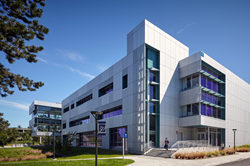
The T Building on the BC campus where most nursing classes are held
“With historic unemployment, we know that most Washingtonians are currently working. And we know many of our students are balancing family responsibilities too. We must meet them where they’re at to address the nursing shortage crisis.”
BELLEVUE, Wash. (PRWEB)
October 05, 2022
We’ve all seen the news—nursing shortages due to the unprecedented impact of COVID-19 on healthcare systems, while nursing graduates are on the decline.* To help bolster the Pacific Northwest healthcare system and provide more opportunities to students eager to join the field, Bellevue College (BC) announced today an expansion of its Associate Degree in Nursing (ADN) program.
Before, all ADN students had to enroll in Fall Quarter or Winter Quarter and take a full-time class load. Starting in Spring 2023, students can enroll in Fall, Winter or Spring Quarters, and have ten quarters, instead of 6, to complete their degree. It’s a huge bonus for students who need to work while going to college part-time. And it allows for more reentry points for students who may have started the ADN program in the past but were unable to finish it.
“With historic unemployment, we know that most Washingtonians are currently working,” says Dr. Antwinett O. Lee, dean of the Nursing Program. “And we know many of our students are balancing family responsibilities too. We must meet them where they’re at to address the nursing shortage crisis, and this expansion will give them the time and flexibility to earn their degree on their terms.”
The ADN program prepares graduates for beginning-level clinical practice as registered nurses and has a 96% pass rate for the RN licensure exam. It’s a great option for high school graduates who want to enter the healthcare field or those working as nursing assistants who want to become registered nurses. According to the U.S. Bureau of Labor Statistics, the annual median wage of a registered nurse in Washington state is $95,350.
A key goal of the expansion is also to increase the diversity of the nursing cohorts, and ultimately the workforce, by appealing to students from underrepresented communities who might be hesitant to take on a full-time class schedule due to work commitments.
“We’re still not seeing an equal representation of ethnicities and identities of registered nurses to the general population,” added Lee. “Studies have shown that a lack of diversity in healthcare can impact patient trust, and the quality of care that people of color receive. This disparity will only become more acute if we don’t address it in our academic institutions.”
Another change to the program is the increased use of its cutting-edge simulation lab to reduce the hours needed in face-to-face clinical hours, another barrier for many working students. It will however continue to combine classroom coursework with clinical study focused on adult, pediatric, and maternal patients, and its partnerships with the Veteran’s Administration, Valley Medical Center, Overlake Hospital, and Swedish Hospital for those in-person hours.
“We’re excited to offer more flexible options for students, and help increase the pipeline of caring, dedicated nursing professionals. This is a win for everyone–students, the College, the region’s hospitals and our shared community,” said Dr. Lee.
To learn more about the ADN program, visit bellevuecollege.edu/nursing/adn. Drop-in info sessions are also available by online reservation: bellevuecollege.edu/nursing/advising/information-sessions/adn.
Share article on social media or email:

